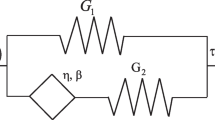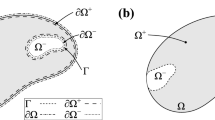Abstract
To improve the efficiency of solving uncertainty design optimization problems, a gradient-based optimization framework is herein proposed, which combines the dimension adaptive polynomial chaos expansion (PCE) and sensitivity analysis. The dimensional adaptive PCE is used to quantify the quantities of interest (e.g., reliability, robustness metrics) and the sensitivity. The dimensional adaptive property is inherited from the dimension adaptive sparse grid, which is used to evaluate the PCE coefficients. Robustness metrics, referred to as statistical moments, and their gradients with respect to design variables are easily derived from the PCE, whereas the evaluation of the reliability and its gradient require integrations. To quantify the reliability, the framework uses the Heaviside step function to eliminate the failure domain and calculates the integration by Monte Carlo simulation with the function replaced by PCE. The PCE is further combined with Taylor’s expansion and the finite difference to compute the reliability sensitivity. Since the design vector may affect the sample set determined by dimension adaptive sparse grid, the update of the sample set is controlled by the norm variations of the design vector. The optimization framework is formed by combining reliability, robustness quantification and sensitivity analysis, and the optimization module. The accuracy and efficiency of the reliability quantification, as well as the reliability sensitivity, are verified through a mathematical example, a system of springs, and a cantilever beam. The effectiveness of the framework in solving optimization problems is validated by multiple limit states example, a truss optimization example, an airfoil optimization example, and an ONERA M6 wing optimization problem. The results demonstrate that the framework can obtain accurate solutions at the expense of a manageable computational cost.




























Similar content being viewed by others
References
Ahammed M, Melchers RE (2006) Gradient and parameter sensitivity estimation for systems evaluated using Monte Carlo analysis. Reliab Eng Syst Saf 91:594–601. https://doi.org/10.1016/j.ress.2005.04.005
Au SK (2005) Reliability-based design sensitivity by efficient simulation. Comput Struct 83:1048–1061. https://doi.org/10.1016/j.compstruc.2004.11.015
Beyer HG, Sendhoff B (2007) Robust optimization - a comprehensive survey. Comput Method Appl M 196:3190–3218. https://doi.org/10.1016/j.cma.2007.03.003
Bungartz HJ, Dirnstorfer S (2003) Multivariate quadrature on adaptive sparse grids. Computing 71:89–114. https://doi.org/10.1007/s00607-003-0016-4
Ching JY, Hsieh YH (2007) Local estimation of failure probability function and its confidence interval with maximum entropy principle. Probabilistic Engineering Mechanics 22:39–49. https://doi.org/10.1016/j.probengmech.2006.05.002
Da Ronch A, Ghoreyshi M, Badcock KJ (2011) On the generation of flight dynamics aerodynamic tables by computational fluid dynamics. Prog Aerosp Sci 47:597–620. https://doi.org/10.1016/j.paerosci.2011.09.001
Ditlevsen O, Bjerager P (1989) Plastic reliability-analysis by directional simulation. J Eng Mech-Asce 115:1347–1362. https://doi.org/10.1061/(Asce)0733-9399(1989)115:6(1347)
Du X, Chen W (2004) Sequential optimization and reliability assessment method for efficient probabilistic design. J Mech Design 126:225. https://doi.org/10.1115/1.1649968
Du S, Guo J, Zhao Z, Zeng S (2014) Non-intrusive polynomial chaos based mechanism reliability sensitivity analysis. In: 2014 prognostics and system health management conference (PHM-2014 Hunan), 24–27 Aug. 2014 2014. pp 515–519. https://doi.org/10.1109/PHM.2014.6988226
Duan NQ (2006) Optimize Truss by FSD and SLP. https://ww2.mathworks.cn/matlabcentral/fileexchange/12401-optimize-truss-by-fsd-and-slp (online available)
Economon TD, Palacios F, Copeland SR, Lukaczyk TW, Alonso JJ (2016) SU2: an open-source suite for multiphysics simulation and design. AIAA J 54:828–846. https://doi.org/10.2514/1.J053813
Eldred M, Burkardt J (2009) Comparison of non-intrusive polynomial chaos and stochastic collocation methods for uncertainty quantification. In: 47th AIAA Aerospace Sciences Meeting including The New Horizons Forum and Aerospace Exposition. Aerospace Sciences Meetings. American Institute of Aeronautics and Astronautics. https://doi.org/10.2514/6.2009-976
Eldred MS, Agarwal H, Perez VM, Wojtkiewicz SF, Renaud JE (2007) Investigation of reliability method formulations in DAKOTA/UQ. Struct Infrastruct E 3:199–213. https://doi.org/10.1080/15732470500254618
Enevoldsen I, Sørensen JD (1993) Reliability-based optimization of series systems of parallel systems. J Struct Eng 119:1069–1084. https://doi.org/10.1061/(asce)0733-9445(1993)119:4(1069)
Garcke J, Griebel M, Thess M (2001) Data mining with sparse grids. Computing 67:225–253. https://doi.org/10.1007/s006070170007
Gerstner T, Griebel M (2003) Dimension adaptive tensor product quadrature. Computing 71:65–87. https://doi.org/10.1007/s00607-003-0015-5
Hohenbichler M, Rackwitz R (1986) Sensitivity and importance measures in structural reliability. Civ Eng Syst 3:203–209. https://doi.org/10.1080/02630258608970445
Hu XZ, Chen XQ, Parks GT, Yao W (2016) Review of improved Monte Carlo methods in uncertainty-based design optimization for aerospace vehicles. Prog Aerosp Sci 86:20–27. https://doi.org/10.1016/j.paerosci.2016.07.004
Jensen HA, Mayorga F, Valdebenito MA (2015) Reliability sensitivity estimation of nonlinear structural systems under stochastic excitation: a simulation-based approach. Comput Method Appl M 289:1–23. https://doi.org/10.1016/j.cma.2015.01.012
Karamchandani A, Cornell CA (1992) Sensitivity estimation within first and second order reliability methods. Struct Saf 11:95–107. https://doi.org/10.1016/0167-4730(92)90002-5
Keshavarzzadeh V, Meidani H, Tortorelli DA (2016) Gradient based design optimization under uncertainty via stochastic expansion methods. Comput Method Appl M 306:47–76. https://doi.org/10.1016/j.cma.2016.03.046
Keshavarzzadeh V, Fernandez F, Tortorelli DA (2017) Topology optimization under uncertainty via non-intrusive polynomial chaos expansion. Comput Method Appl M 318:120–147. https://doi.org/10.1016/j.cma.2017.01.019
Keshtegar B, Hao P (2016) A hybrid loop approach using the sufficient descent condition for accurate, robust, and efficient reliability-based design optimization. J Mech Design 138:121401–121411. https://doi.org/10.1115/1.4034173
Keshtegar B, Hao P (2017) A hybrid self-adjusted mean value method for reliability-based design optimization using sufficient descent condition. Appl Math Model 41:257–270. https://doi.org/10.1016/j.apm.2016.08.031
Keshtegar B, Hao P (2018) Enhanced single-loop method for efficient reliability-based design optimization with complex constraints. Struct Multidiscip O 57:1731–1747. https://doi.org/10.1007/s00158-017-1842-x
Klimke WA (2006) Uncertainty modeling using fuzzy arithmetic and sparse grids. PhD thesis, Institut für Angewandte Analysis und Numerische Simulation Universität Stuttgart
Kwak BM, Lee TW (1987) Sensitivity analysis for reliability-based optimization using an Afosm method. Comput Struct 27:399–406. https://doi.org/10.1016/0045-7949(87)90064-2
Lelievre N, Beaurepaire P, Mattrand C, Gayton N, Otsmane A (2016) On the consideration of uncertainty in design: optimization - reliability - robustness. Struct Multidiscip O 54:1423–1437. https://doi.org/10.1007/s00158-016-1556-5
Li J (2016) Probability density evolution method: background, significance and recent developments. Probabilistic Engineering Mechanics 44:111–117. https://doi.org/10.1016/j.probengmech.2015.09.013
Lopez RH, Beck AT (2012) Reliability-based design optimization strategies based on FORM: a review. J Braz Soc Mech Sci 34:506–514. https://doi.org/10.1590/S1678-58782012000400012
Melchers RE, Ahammed M (2004) A fast approximate method for parameter sensitivity estimation in Monte Carlo structural reliability. Comput Struct 82:55–61. https://doi.org/10.1016/j.compstruc.2003.08.003
Meng Z, Li G, Wang BP, Hao P (2015) A hybrid chaos control approach of the performance measure functions for reliability-based design optimization. Comput Struct 146:32–43. https://doi.org/10.1016/j.compstruc.2014.08.011
Meng Z, Zhou HL, Li G, Yang DX (2016) A decoupled approach for non-probabilistic reliability-based design optimization. Comput Struct 175:65–73. https://doi.org/10.1016/j.compstruc.2016.06.008
Meza JC, Oliva RA, Hough PD, Williams PJ (2007) OPT++: an object-oriented toolkit for nonlinear optimization. Acm T Math Software 33:12. https://doi.org/10.1145/1236463.1236467
Padulo M, Campobasso MS, Guenov MD (2011) Novel uncertainty propagation method for robust aerodynamic design. AIAA J 49:530–543. https://doi.org/10.2514/1.J050448
Palacios F (2013) Problem workshop II: design and optimization using SU2. https://su2code.github.io/documents/Design_and_Optimization_Using_SU2.pdf (online available)
Papadimitriou DI, Papadimitriou C (2016) Aerodynamic shape optimization for minimum robust drag and lift reliability constraint. Aerosp Sci Technol 55:24–33. https://doi.org/10.1016/j.ast.2016.05.005
Park C, Kim NH, Haftka RT (2015) The effect of ignoring dependence between failure modes on evaluating system reliability. Struct Multidiscip O 52:251–268. https://doi.org/10.1007/s00158-015-1239-7
Rackwitz R (2001) Reliability analysis—a review and some perspectives. Struct Saf 23:365–395. https://doi.org/10.1016/s0167-4730(02)00009-7
Royset JO, Polak E (2004) Reliability-based optimal design using sample average approximations. Probabilistic Engineering Mechanics 19:331–343. https://doi.org/10.1016/j.probengmech.2004.03.001
Schillings C (2010) Optimal aerodynamic design under uncertainties. PhD thesis, Universität Trier
Schillings C, Schulz V (2015) On the influence of robustness measures on shape optimization with stochastic uncertainties. Optim Eng 16:347–386. https://doi.org/10.1007/s11081-014-9251-0
Smoljak SA (1963) Quadrature and interpolation formulas for tensor products of certain classes of functions. Dokl Akad Nauk SSSR 148:1042–1045 http://www.mathnet.ru/php/archive.phtml?wshow=paper&jrnid=dan&paperid=27586&option_lang=eng (online available)
Taflanidis AA, Jia GF (2011) A simulation-based framework for risk assessment and probabilistic sensitivity analysis of base-isolated structures. Earthq Eng Struct D 40:1629–1651. https://doi.org/10.1002/eqe.1113
Torii AJ, Lopez RH, Miguel LFF (2017) A gradient-based polynomial chaos approach for risk and reliability-based design optimization. J Braz Soc Mech Sci 39:2905–2915. https://doi.org/10.1007/s40430-017-0815-8
Valdebenito MA, Jensen HA, Hernandez HB, Mehrez L (2018) Sensitivity estimation of failure probability applying line sampling. Reliab Eng Syst Saf 171:99–111. https://doi.org/10.1016/j.ress.2017.11.010
Verma AK, Ajit S, Karanki DR (2016) Reliability and safety engineering. Springer London, London. https://doi.org/10.1007/978-1-4471-6269-8
Wang HY, Kim NH, Kim YJ (2006) Safety envelope for load tolerance and its application to fatigue reliability design. J Mech Design 128:919–927. https://doi.org/10.1115/1.2204971
Wu YT (1994) Computational methods for efficient structural reliability and reliability sensitivity analysis. AIAA J 32:1717–1723. https://doi.org/10.2514/3.12164
Wu XJ, Zhang WW, Song SF (2018) Robust aerodynamic shape design based on an adaptive stochastic optimization framework. Struct Multidiscip O 57:639–651. https://doi.org/10.1007/s00158-017-1766-5
Xiu D, Karniadakis GE (2002) The Wiener--Askey polynomial chaos for stochastic differential equations. SIAM J Sci Comput 24:619–644. https://doi.org/10.1137/s1064827501387826
Yanfang Z, Yanlin Z, Yimin Z (2011) Reliability sensitivity based on first-order reliability method. vol 225. https://doi.org/10.1177/0954406211405938
Yang DX, Liu LB (2014) Reliability analysis of structures with complex limit state functions using probability density evolution method. Struct Multidiscip O 50:275–286. https://doi.org/10.1007/s00158-014-1048-4
Yang G, Da Ronch A, Drofelnik J, Xie Z-T (2018) Sensitivity assessment of optimal solution in aerodynamic design optimisation using SU2. Aerosp Sci Technol 81:362–374. https://doi.org/10.1016/j.ast.2018.08.012
Yao W, Chen XQ, Luo WC, van Tooren M, Guo J (2011) Review of uncertainty-based multidisciplinary design optimization methods for aerospace vehicles. Prog Aerosp Sci 47:450–479. https://doi.org/10.1016/j.paerosci.2011.05.001
Yi P, Cheng GD, Jiang L (2008) A sequential approximate programming strategy for performance-measure-based probabilistic structural design optimization. Struct Saf 30:91–109. https://doi.org/10.1016/j.strusafe.2006.08.003
Youn BD, Choi KK, Du L (2005) Enriched performance measure approach for reliability-based design optimization. AIAA J 43:874–884. https://doi.org/10.2514/1.6648
Zhang T (2018) Reliability-based robust optimal design of structures with variable cross-section. vol 55. https://doi.org/10.1007/978-981-10-6553-8_111
Zhang T, Zhang Y (2016) A new model for reliability design and reliability sensitivity analysis of a hydraulic piston pump. Proceedings of the Institution of Mechanical Engineers, Part O: Journal of Risk and Reliability 231:11–24. https://doi.org/10.1177/1748006x16681713
Zhao W, Liu JK, Ye JJ (2011) A new method for parameter sensitivity estimation in structural reliability analysis. Appl Math Comput 217:5298–5306. https://doi.org/10.1016/j.amc.2010.11.053
Funding
The present work was partially supported by the Fundamental Research Funds for the Central Universities (Grant no. G2016KY0302), the National Defense Fundamental Research Funds of China (Grant no. JCKY2016204B102), China Civil Aerospace Program (Grant no. D010403), and the Natural National Science Foundation of China (Grant no. 51505385, 11502209).
Author information
Authors and Affiliations
Corresponding author
Additional information
Responsible editor: W. H. Zhang
Publisher’s Note
Springer Nature remains neutral with regard to jurisdictional claims in published maps and institutional affiliations.
Rights and permissions
About this article
Cite this article
Fang, H., Gong, C., Su, H. et al. A gradient-based uncertainty optimization framework utilizing dimensional adaptive polynomial chaos expansion. Struct Multidisc Optim 59, 1199–1219 (2019). https://doi.org/10.1007/s00158-018-2123-z
Received:
Revised:
Accepted:
Published:
Issue Date:
DOI: https://doi.org/10.1007/s00158-018-2123-z




